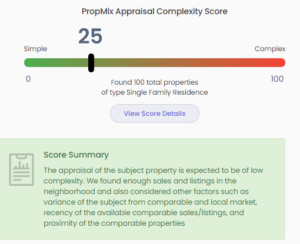Appraisal Complexity Reports in Profet.ai provide a quick indication of the potential complexity of performing an appraisal and deriving a value for a property. The report provides a simple complexity score in the range 1 – 100 with scores below 50 indicate low complexity and scores exceeding 50 indicate a gradual increase in complexity.
Knowing the appraisal complexity upfront has many important implications and uses for the various parties in the mortgage transaction:
- Lenders, Appraisal Management Companies (AMCs), and Appraisers have to comply with Lenders, TRID – TILA/RESPA Integrated Disclosure Rule. Loan cost estimates provided to a borrower include appraisal costs and it cannot be changed after presenting it to the borrower unless the property is determined to be very complex based on specific criteria stipulated in the TRID rules.
- Lenders and AMCs would also like to understand their operational costs and their potential margins on a transaction at the beginning of the loan process.
- Complexity Score is also an indicator of the valuation risk in the subject property which is valuable for the underwriter to assess the collateral risk.
- AMCs can assign an appraisal to specific appraisers based on complexity and the expertise required – thereby optimizing the appraisal process.
Profet.ai computes a complexity score for any property nationwide using its listing and public record databases and considering numerous factors that may contribute to an intricate valuation process:
- Number of available comparables for the subject: the lesser the number of available comparables, the higher the Complexity Score.
- Market variance: Subject property characteristics compared to the general neighborhood
- Comparable variance: Subject property characteristics compared to the “closest” comparable sales and listings
- Closest sales are identified as a combination of similarity and proximity of the comparable properties.
- Market Conditions such as recency of the comparable sales – recent 6 months vs. prior 6 months.
- Type of location – Urban, Suburban, or Rural
The subject property characteristics considered for variance analysis include Bedroom count, Bathroom count, Gross Living Area, Lot Size, Year Built, Price per Square Foot, and Property Type (Single Family, Townhouse, etc.)
These factors are fed into a combination of statistical and machine learning models to arrive at a complexity score. The complexity report output includes all the supporting information to understand the appraisal assignment.

- Numerical Complexity Score with a definition and narrative description
- Subject Property Details including listing, if available, and public record
- Summary of the market and comparable sales
- Interactive map of the subject property and the comparables
- Property details from listing and public records for every comparable sale
- Variance Analysis of the Subject as compared to the comparables
- Variance Analysis of the Subject as compared to the neighborhood
In addition to the above, the report can optionally include flood maps and flood data. Please see here for flood information support in Profet.ai.
You can read more about how to generate an Appraisal Complexity Report here.
